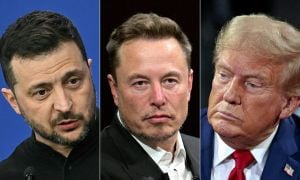NATO and Ukraine are convening emergency discussions to address the significant escalation brought about by Russia's latest hypersonic missile strike. This diplomatic maneuver follows the Kremlin's use of the Oreshnik missile, which flew at speeds exceeding ten times the speed of sound, targeting the central Ukrainian city of Dnipro. The assault has intensified the already convoluted conflict persisting now for over 33 months, raising alarming questions about the region's security and the adequacy of current defensive strategies.
The urgency of the talks, scheduled for Tuesday, March 26, 2024, stems from the missile's purported capabilities and Russia's assertive declarations. President Vladimir Putin claimed during a recent address, "No one in the world has such weapons," highlighting the missile's capacity to elude existing Western air defense systems. General Sergei Karakayev, head of Russia's strategic missile forces, reiterated this claim, stating the Oreshnik is likely to be armed with either nuclear or conventional warheads as he warned of its potential reach across Europe.
Putin's declaration of support for ramping up the production of these advanced missiles signals his government's commitment to utilizing cutting-edge military technology as part of its arsenal against what he describes as growing threats from the West. The Kremlin launched this missile strike partly as retaliation against Ukraine's increased utilization of US and UK long-range missiles capable of staging strikes deep within Russian territory.
Security analysts warn this development could prompt NATO and its allies to reevaluate their strategic stance, especially considering the increased capabilities of Russian armaments. The U.S. had, until recently, focused on conventional defensive measures, but the introduction of hypersonic technology alters the calculations drastically. By employing missiles capable of overwhelming traditional missile defense systems, Russia is erasing the line between conventional and nuclear conflict scenarios, potentially reshaping the defense paradigms of European nations.
Ukraine's parliament reacted swiftly to the missile attack, canceling scheduled sessions to reassess its security protocols amid heightened anxieties. Although no casualties were reported from the strike on Dnipro, the damage to infrastructure raises concerns about civilian safety and the resilience of Ukraine’s defense systems against this new class of threats.
EU leaders have responded with condemnation, categorizing Russia's actions as heinous and reckless. Polish Prime Minister Donald Tusk labeled the conflict as entering a decisive phase, emphasizing the urgent need for strengthened alliances and support for Ukraine's defense capabilities. Czech Foreign Minister Jan Lipavsky echoed similar sentiments, asserting the need for enhanced air defense systems to safeguard Ukrainian citizens from such missile threats, which he termed as malicious provocations.
Given the geopolitical stakes involved, Ukraine and NATO's decision to engage directly signifies the seriousness of the threat posed by Russia's advanced missile technology. The upcoming discussions are expected to facilitate urgent deliberations on potential defensive upgrades, including bolstering secure lines of communication and increasing military aid to Ukraine.
Meanwhile, Russia's strategic rhetoric continues to paint the West as the aggressor, fortifying domestic narratives to justify military actions overseas. Putin's description of the Oreshnik missile's unique capabilities alongside critiques of Western defense systems portrays Russia as both technologically superior and strategically prepared for confrontation.
The outcome of the NATO-Ukraine talks may pivotally influence future military strategies and alliances, impacting not only the balance of power between NATO and Russia but also the stability of the European security architecture at large. The continuing developments will be closely monitored by international observers, who highlight the inherent instability introduced by hypersonic weapons on conventional warfare dynamics.
At the heart of this crisis is the urgent need to address how nations employ technology to achieve military objectives, ensuring defense systems can keep pace with these advancements.



